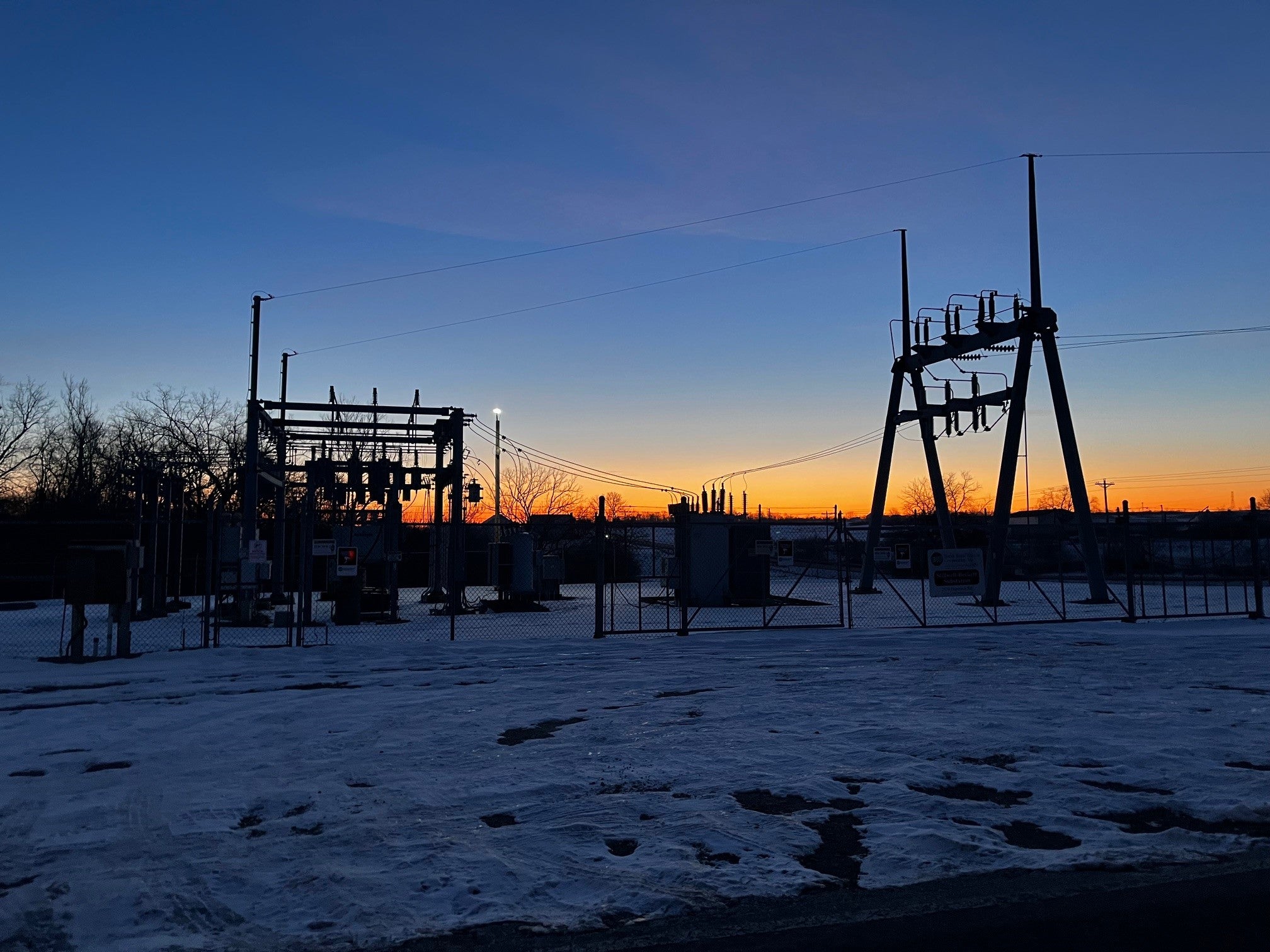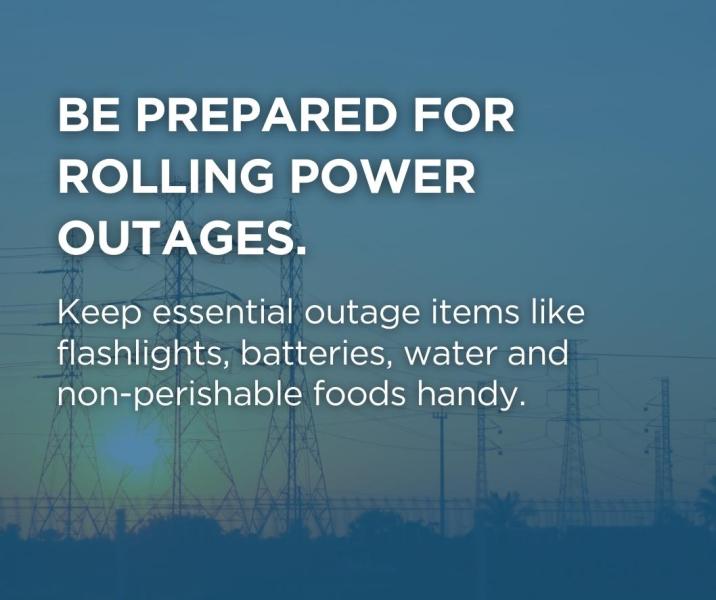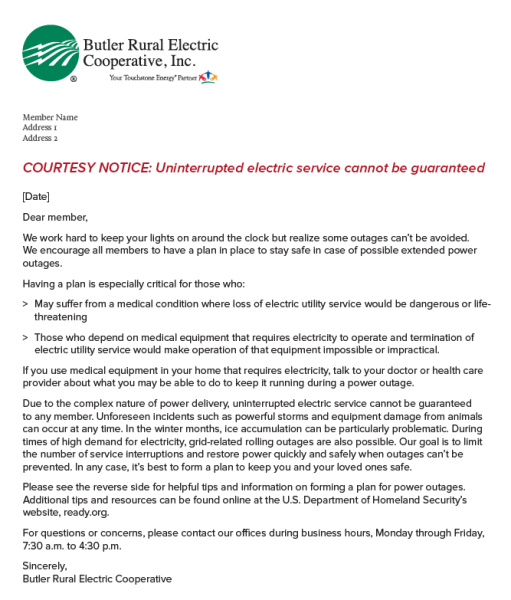3888 Stillwell Beckett Rd Oxford, OH 45056
Rolling Power Outages
Rolling power outages are temporary, planned interruptions to manage energy demand during critical periods. These controlled measures help maintain grid stability and prevent widespread outages. Stay informed for updates.

Planned Power Interruptions
Rolling Power Outages
When outdoor temperatures drop, our electricity use increases. That’s because we’re doing more activities inside, and our heating systems are running longer and more often to counteract colder outdoor temperatures. Factor in that we all tend to use electricity at the same times — in the morning and early evenings — and that equals a lot of strain on our electric grid.
At Butler Rural Electric Cooperative, we work closely with our local generation and transmission (G&T) cooperative in resource and infrastructure planning to ensure you have the power you need whenever you flip a switch, but the electric grid is much larger than your local co-op and G&T.
In winter months, when even more electricity is being used simultaneously across the country, it is possible for electricity demand to exceed supply, especially if an unexpected event like a sudden snow or ice storm or equipment malfunction occurs. If this happens, which is rare, the grid operator for our region of the country may call for rolling power outages to relieve pressure on the grid, and Butler Rural Electric Cooperative will inform you about the situation.
Butler Rural Electric Cooperative and our G&T, Buckeye Power, take proactive steps to create a resilient portion of the grid and ensure electric reliability in extreme weather, including regular system maintenance, grid modernization efforts, and disaster response planning, but it takes everyone to keep the grid reliable.
To help keep the heat on for you, your family, and neighbors, here are a few things you can do to relieve pressure on the grid (and save a little money along the way):
> Select the lowest comfortable thermostat setting and turn it down several degrees whenever possible. Your heating system must run longer to make up the difference between the thermostat temp and the outdoor temp.
> Pro tip: Seal air leaks around windows and exterior doors with caulk and weather stripping. Air leaks and drafts force your heating system to work harder than necessary.
> Stagger your use of major appliances such as dish washers, ovens, and clothes dryers.
> Pro tip: Start the dishwasher before you go to bed and use smaller countertop appliances like slow cookers and air fryers to save energy.
> Ensure your heating system is optimized for efficiency with regular maintenance and proper insulation.
> Pro tip: Make sure your furnace filter isn’t clogged and dirty. Replace it as-needed.
> When possible, use cold water to reduce water heating costs.
> Pro tip: Setting your water heater thermostat to 120 degrees can help you save energy and reduce mineral buildup and corrosion in your water heater and pipes.
> Unplug devices when not in use to eliminate unnecessary energy use. Even when turned off, electronics in standby mode consume energy.
> Pro tip: Plug devices into a power strip so you can turn them all off at once with the push of a button.
As we face the challenges posed by winter weather, understanding its impact on energy demand is crucial for maintaining a reliable power supply. By adopting energy conservation practices during periods of extreme cold, not only can you save money on your electric bills, but you can also contribute to the resilience of the power grid, keeping our local community warm and connected.
Typically, electricity is available at the flip of a switch. But you may not realize the electricity you use is forecasted, planned, and purchased before it makes its way to your home or business. The electric grid must be maintained at a certain frequency. When extreme temperatures drive up electricity demand, the grid may not be able to keep pace.
That’s why rotating temporary outages can help rebalance the grid, without having to shutdown larger, widespread areas. Rolling outages are a last resort but prevent serious damage to the grid.
If you receive an alert that rolling outages are possible, you can help by reducing your energy use. The best area to conserve is your thermostat. Set your thermostat lower than normal as health allows and avoid using energy-intensive appliances, like water heaters, washing machines, clothes dryers, and dishwashers. You can also unplug any unused electrical items.
If you or someone you care for is dependent on life-supporting medical devices, make a plan in case service interruption becomes necessary. When rolling power outages are likely, we also encourage you to share the information with others who could be affected but may not receive Butler Rural Electric Cooperative’s updates, for example, an elderly neighbor or a loved one.
Cooperatives in Ohio have adequate generation to meet their needs. However, we are connected to the same electric grid as everyone else in other states and regions and are subject to the impact of issues on this larger grid.
For the latest updates, follow Butler Rural Electric Cooperative’s Facebook page and website, butlerrural.coop. You can also sign up to receive text notifications through SmartHub.
Butler Rural Electric Cooperative is a local electric distribution cooperative and is a member of Buckeye Power, a generation and transmission electric cooperative. Buckeye Power generates or purchases electricity at power plants across the state and region, then delivers that electricity along high-voltage transmission lines to Butler Rural Electric Cooperative and 24 other local electric distribution cooperatives in Ohio. From there, each electric distribution cooperative distributes the electricity to homes, schools, and businesses – the places where people need it.
With 25 cooperatives working together as one mutual source of power, the service provided to nearly 400,000 across the state is more affordable and reliable than it would be if each system operated alone. With that same concept in mind, Buckeye Power is part of PJM, a regional transmission organization. PJM is a large network that joins Buckeye Power with other electric utilities in parts of Delaware, Illinois, Indiana, Kentucky, Maryland, Michigan, New Jersey, North Carolina, Ohio, Pennsylvania, Tennessee, Virginia, West Virginia, and the District of Columbia. Working together, each utility in the network can provide more affordable and reliable electricity than if each power company operated independently.
PJM acts much like an air traffic controller. PJM does not own the power plants or power lines, but helps direct the flow of electricity between the power companies.
PJM also acts as an auctioneer, working together with Buckeye Power and other PJM members with the goal of producing electricity for their consumers at the lowest cost possible while making sure electricity is always available. Every generating plant offers to supply power to the grid on an hourly basis. Low offers for a given period get to supply power, while more costly offers do not, unless more costly power is needed for reliability or operational constraints. With this process, the PJM generation market ensures power is provided to the grid at the lowest possible cost.
Beyond affordability and reliability, PJM is technology-neutral, giving grid access to a variety of energy resources. The PJM pool of generation resources includes wind, solar, and hydropower, in addition to more traditional sources of electricity – natural gas, coal, and nuclear. Each type of power generation technology has unique attributes, which determine the cost of producing power and how often it’s available for operation.
Butler Rural Electric Cooperative and the other Ohio cooperatives, through our relationship with Buckeye Power, have a unique position in the PJM market. We are both a generator of electricity and a buyer. We reap benefits from owning our own assets, but at the same time we are impacted by events that affect the power grid.
Overall, the relationships demonstrated between Butler Rural Electric Cooperative, Buckeye Power, and PJM holds true to the cooperative way of doing business. All three entities demonstrate the power of working together to provide affordable and reliable energy to the members we’re proud to serve.
No, not necessarily. Peak Alerts are issued when demand for electricity is nearing a new annual peak. When a new electric peak is established, it may affect future generation and transmission cost.
Peak Alerts are ways for members to help hold down electric costs. However, it is possible for a Peak Alert and a Rolling Power Outage notice to occur at the same time.
Butler Rural Electric Cooperative only implements rolling power outages when our region’s electric grid manager, PJM, determines they are absolutely necessary. When regional electricity supply is low and can’t keep pace with total consumer demand, rolling outages help balance the electric grid to prevent widespread, uncontrolled outages. The cooperatives in Ohio have generation capacity to supply cooperative loads. However, our system is operating as part of a larger grid. When electricity supply is low, or the high voltage transmission system becomes constrained, rolling outages may be used to help balance the grid to prevent widespread uncontrolled outages.
We understand even a brief outage can be uncomfortable. Implementing rolling outages is a last resort. Please know Butler Rural Electric Cooperative will do everything we can to limit the length of the outages.


